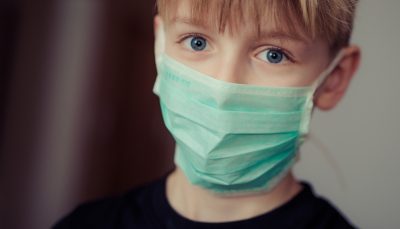
By Cian Molloy - 01 March, 2020
Do not use holy water fonts and do not shake hands during and after religious services, says new guidance issued by

Increasingly, people are wearing face masks to help prevent the spread of the coronavirus (Pic: Good Free Pics).
the Health Service Executive (HSE) to help halt the spread of the deadly COVID-19 Coronavirus.
The HSE guidance, issued on Friday, is targeted at practices “specific to Christian religious services” but is designed to be adapted by “people from other religious groups.” The guidance is more stringent than the advice issued by Archbishop Diarmuid Martin to his parish priests at the start of February.
The new disease, COVID-19, broke out in Wuhan, China in late December and has since spread rapidly thanks to the fact that we live in an increasingly interconnected world where intercontinental air travel is commonplace. The symptoms of the disease include coughing, shortness of breath and fever. For many, an infection results in only a mild illness, but for some, especially the elderly, infection can lead to pneumonia, severe acute respiratory syndrome or kidney failure — all potential causes of death.
The key to preventing the spread of the disease is good hand hygiene. As a result, the HSE advises that Ministers of the Eucharist should wash their hands or use alcohol-based hand gels before distributing Holy Communion. Holy Communion should only be administered into the hands of communicants “and NOT onto the tongue”.
The HSE guidance states: “Because COVID-19 is a new disease and appears to spread easily between people, we advise that holy water fonts should not be used.” This goes beyond the advice issued in the Dublin diocese last month when it was proposed that holy water fonts continue to be used, but that they be washed regularly.
In addition to suggesting the suspension of physical interactions during religious services, including shaking hands during the Sign of Peace, the HSE asks that clergy end the practice of shaking hands with lay people when greeting people when they arrive for Mass or when they are departing for home after worship.
“Most physical interaction during religious services, e.g. shaking hands while exchanging the ‘Sign of Peace’ in Christian religious services, involves a low risk of spreading the virus especially if members of the congregation who are unwell do not attend religious services while they are ill,” says the HSE guidance.
“However, because COVID-19 is a new disease that has not been seen in people before, we need to exercise extreme caution to limit the spread of the virus. Current information suggests that COVID-19 can spread easily between people and could be spread from an infected person even before they develop any symptoms. For these reasons we suggest that physical interaction during religious services, including the Sign of Peace, should be suspended.”
A key HSE recommendation is that clergy and laity should not attend religious services if they are ill.
Additionally, the guidance includes the following:
Clergy need to carefully consider how they will provide pastoral and spiritual care, including last rites, to members of the laity who are ill.
The HSE guidance states: “To date, there have been no cases of COVID-19 in Ireland. If there is a case, it is highly likely that the patient will be treated in a hospital and their pastoral care can be provided in the hospital according to established protocols and with full compliance with infection prevention and control guidance and in close consultation with their treating doctor.
“People at increased risk of getting COVID-19, including people who have been in close contact with a person with COVID-19, may be asked to limit their social interactions for 14 days, including staying at home and not attending work or religious services. In order to reduce the possible spread of infection, these people should not be visited by religious leaders/members of the clergy while they are in self isolation. Pastoral care can be provided over the telephone/skype if resources permit.”